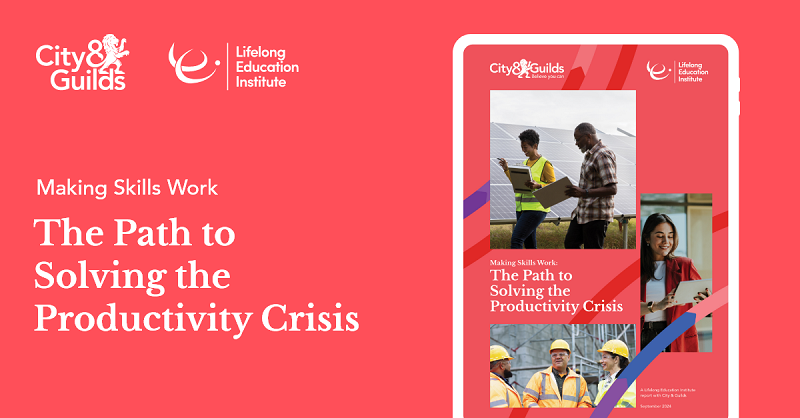Making Skills Work: City & Guilds Productivity Report champions skills as key to unlock UK growth
City & Guilds’ report finds acute regional skills disparities across the UK and calls for the new government to place skills policy at the heart of its growth strategy.
23 September 2024

At City & Guilds, we understand the role of skills development in contributing to growth and productivity – and its role improving living standards and opportunities.
With productivity growth in the UK remaining stagnant, and the new government’s introduction of ‘Skills England’, we have a once-in-a-generation opportunity to create a more equitable system and improve economic and individual prosperity.
Our report; Making Skills Work: The Path to Solving the Productivity Crisis, produced with the Lifelong Education Institute, provides a detailed account of the past 60 years of skills and education policy, together with insights on how the productivity puzzle can be addressed through skills development.
The report includes research commissioned by City & Guilds, which surveyed 1,000 decision makers in UK businesses and 2,000 working-age adults – finding strong links between skills and productivity, and wide regional divergence in opportunity:
- A sizeable majority of senior decision makers (74%) and over 9 in 10 (91%) of CEOs identify building their workforce’s skills as crucial for boosting productivity
- Fewer than half of working age adults (48%) feel that they left their time in education with the right skills to transition into a career of their choice.
- A large minority (40%) of respondents that are not in work (students, unemployed, retired) are not confident they have the skills now required to enter the workforce.
- Fewer than half of all working age adults (48%) feel that they left their time in education with the right skills to transition into a career of their choice.
Kirstie Donnelly MBE, CEO of City & Guilds, said:
“We have a once in a generation opportunity to clean the slate of skills policy for good and create a holistic, long-term strategy for uplifting our economy through skills provision that works.
While skills and talent are everywhere across the UK, opportunity is not – this is to the detriment of people’s life chances, and to productivity and economic growth across the country. Too many people leave school without the skills and direction they need to enter meaningful work and careers in their region, and then don’t have the opportunity to upskill throughout their life. It’s mission critical that we put that right, and better match people’s skills and potential with opportunity.”
In a foreword for the report, The Rt Hon. the Lord Blunkett said:
“This timely report provides a detailed and enlightening roadmap for skills policy - which complements the new Government’s work to unlock productivity in the UK, and help the country meet the challenges ahead.”
The report also sets out our recommendations to government, both on the wider skills agenda and to support with the formation of a robust and effective Skills England. For full details please read the report, below we set out some of our key proposals:
Our recommendations for government:
- Government should introduce a reformed version of the Lifelong Learning Entitlement to support upskilling and reskilling among the existing workforce, especially modular courses at Levels 4 – 6.
- Government should consider the availability of qualifications across all stages of learning. Key to this will be the opportunity afforded by qualification reform, including the chance to look at a sustainable and scalable model for T Levels, and to explore available resources for vocational qualifications that can make a more direct contribution to productivity growth.
- Government should establish a memorandum of understanding between the Office for Students and Skills England to steer cooperation and coordination of technical and vocational courses.
Our commitment to boosting productivity:
- Continuing to raise awareness of the relationship between skills and productivity, and promote courses that can evidence direct productivity gains.
- Promoting further integration of post-16 education and training, and develop distinct pathways for ‘pre-career’ and ‘mid-career’ learning.
- Conducting further employer analysis to identify where investment in reskilling and upskilling is most urgent, including which industry sectors are capable of crossing the innovation frontier, and which are in danger of being ‘left behind’ by future challenges.
- Formulating guidance for business and education providers on how to integrate more flexibility and inclusivity into working and learning conditions.
Read the full report here
About the research
Research was conducted by Opinium Research, on behalf of City & Guilds. It surveyed 1,000 UK senior decision makers (minimum 50 working in Transport, Energy, Construction and Engineering), and 2,000 UK working age adults aged 18-60. Fieldwork was conducted between 6th and 18th June 2024. Opinium Research is a member of the British Polling Council and abides by its rules.